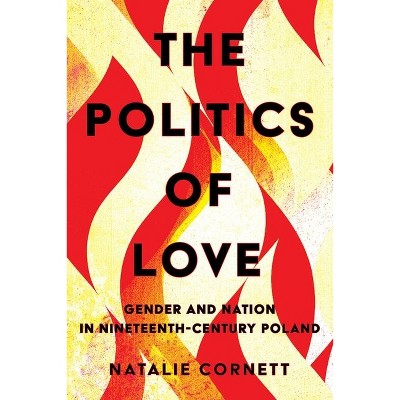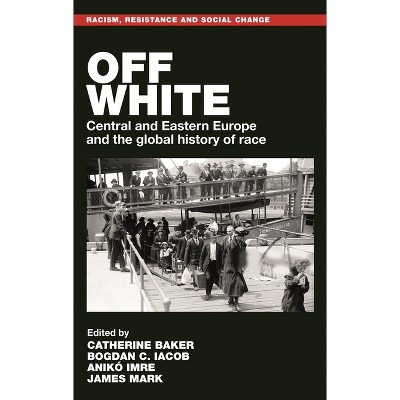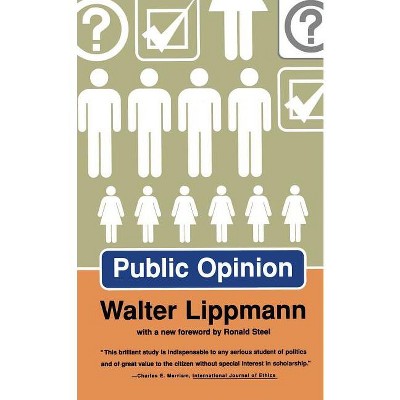Sponsored

The Construction of Public Opinion in a Digital Age - by Catherine Happer (Hardcover)
In Stock
Sponsored
About this item
Highlights
- This book presents a new conceptual model for understanding the role of the media in the construction of public knowledge, belief and opinion in the context of a radically changed communications infrastructure.
- About the Author: Catherine Happer is Senior Lecturer in Sociology at the University of Glasgow and Director of the Glasgow University Media Group.
- 224 Pages
- Social Science, Media Studies
Description
About the Book
This book presents a new conceptual model for understanding the role of the media in the construction of public knowledge, belief and opinion in the context of a radically changed communications infrastructure.Book Synopsis
This book presents a new conceptual model for understanding the role of the media in the construction of public knowledge, belief and opinion in the context of a radically changed communications infrastructure. Drawing on a series of empirical studies conducted over nearly a decade, Happer deploys evidence of a 'disconnect' between neoliberal media and the public which is rooted in a disaffection with a mainstream political culture which has failed to deliver the societal outcomes promised. As people are pushed towards alternative digital sources, new communities of opinion are produced in ways which polarise publics and ultimately limit the potential for social change.
Offering an innovative and urgently needed new sociological analysis, this book is required reading for an inter-disciplinary field of media, journalism, and politics/IR which has largely abandoned questions of media power and public opinion management, as well as policymakers, science communicators and journalists.From the Back Cover
'Poised to become a cornerstone in media and audience studies, Happer's book offers a ground-breaking model for understanding how demands for change are accommodated into systems of power.'
Giuliana Tiripelli, De Montfort University
James Curran, Goldsmiths, University of London
This book presents an innovative new model for understanding how media and communications interact with politics, culture and everyday experience to construct people's ideas and opinions. It locates these processes in a time of constant political crisis, when new technologies are changing how we access information and questions of 'truth' and 'reality' are being radically reworked. The book identifies a growing disconnect between an increasingly centralised media and political class and the public it serves - ripe for exploitation by rightwing political actors but ultimately in the hands of the global tech corporations who control the digital space. Drawing on a decade of empirical research, this ambitious book demonstrates the role of demographics, identity groupings and socio-economic conditions in producing patterns in opinion. With an emphasis on the importance of language, value systems and differentiated media cultures - from BBC News to TikTok shorts - it offers new insights into whether age is replacing class as the key marker of political divisions. The construction of public opinion explores how new mechanisms for controlling thought and opinion limit the potential for social change - and how this might be resisted.
Review Quotes
'Poised to become a cornerstone in media and audience studies, Happer's book offers a ground-breaking model for understanding how demands for change are accommodated into systems of power. Moving from the comprehensive methodologies pioneered by the Glasgow Media Group and extensive empirical evidence across a variety of case studies, Happer expands the field into uncharted territories.
This is a much-needed work for anyone seeking to understand the evolving landscape of communication and its impact on public opinion, and for those who advocate for a focus on solutions to societal problems in media studies. In particular, researchers will appreciate the 6-level working model to analyse opinion formation, and external actors may use it to monitor and develop effective policies supporting democratic debates during crises.' Dr Giuliana Tiripelli, Senior Lecturer, De Montfort University 'This is an elegantly written book that will be of great interest to media academics and students around the world concerned with media power. It offers an empirically rich examination of the media's influence on public opinion and social change in the context of public disaffection and a transformed media landscape.' Professor James Curran, Goldsmiths, University of London 'Questions of trust in journalism and public communication have rarely been more urgent than now. This valuable book offers an expert guide to the economic, social and cultural changes in the media industries that have made those questions so vital today, and sets out important responses to spiralling culture wars.' Professor Graham Meikle, University of WestminsterAbout the Author
Catherine Happer is Senior Lecturer in Sociology at the University of Glasgow and Director of the Glasgow University Media Group.
















